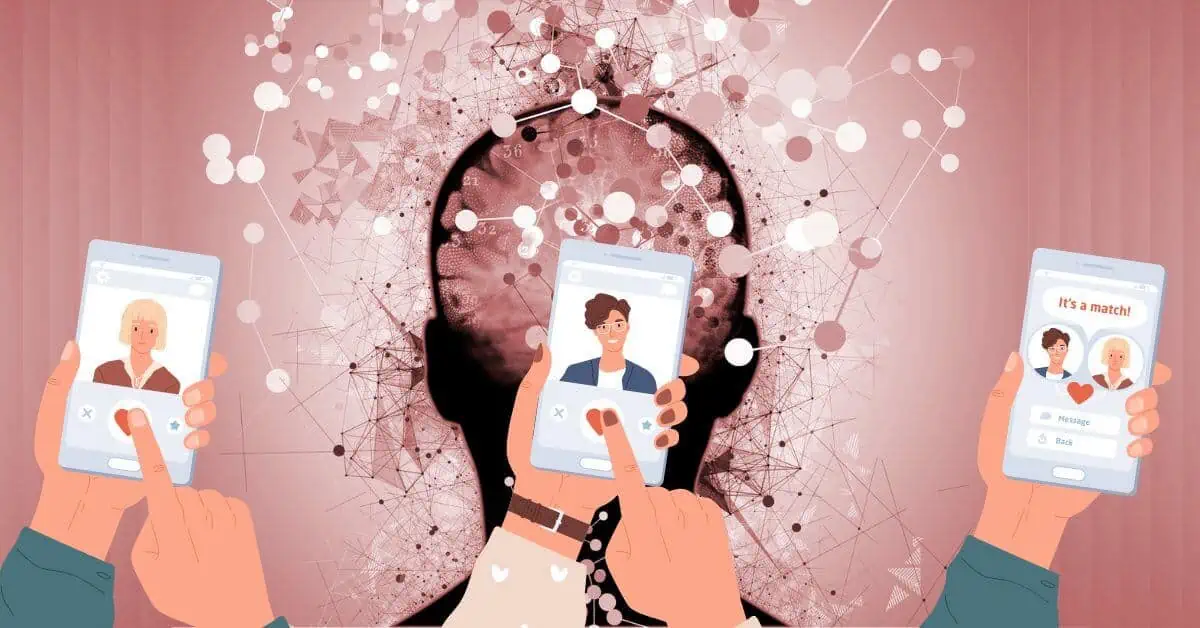Like it or not, dating apps are here to stay–we like it; just sayin’.
The market is flooded with mainstream dating apps and niche ones, meaning there is something for everyone. Whether you are a gamer, a Christian, a successful professional, or even want to date in a virtual reality setting–there’s an app for that!
And if you think they aren’t fostering any serious, long-term relationships, think again–a third of all American marriages now originate online, according to research published in the Journal of the National Academy of Sciences, and over 80% of millennials have downloaded dating apps–Tinder alone has a user base of more than 50 million people.
But we all know that there are exceptions to the rules when it comes to the success rate of dating apps. If dating apps typically don’t lead to face-to-face interactions, why do we keep coming back for more? What is it that makes us want to go back for more? And how does this change the way we feel about ourselves and others?
Even if they don’t always work out in our favor, we continue to go back to them again and again–why do we repeat our behaviors?
There is a psychological aspect at play when it comes to using dating apps, and we are going to find out exactly what the psychology behind swiping is and how dating apps affect the human brain.
How Much Swiping is Too Much Swiping?
The dating app Badoo conducted an online survey among its 370 million members and discovered that people spend 90 minutes each day looking for love on the platform. That’s an hour and a half of swiping!
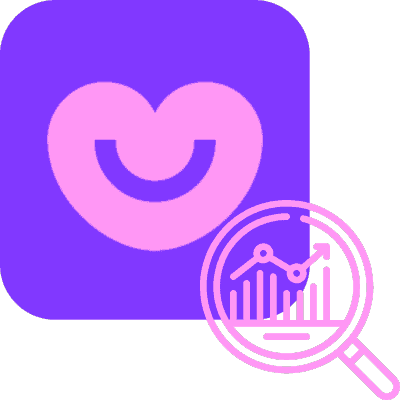
According to Badoo’s data, most users sign in numerous times throughout the day and spend about nine minutes during each search session. It’s important to note that the average duration is 90 minutes–people differ considerably in how much time they spend on dating apps. Because humans are adaptable beings that react to their environments, it stands to reason that prolonged exposure to these services has some effect on our brains.
So what are they actually doing to our neurological pathways?
The Effects of Dating Apps on Brain Function
You’ve likely heard about “gamification” when it comes to relationships–dating apps facilitate this “gamification,” which is likely to set off a cascade of neurochemical reactions.
The neurochemical shifts that occur in the brain cause us to become addicted to dating apps, reports Psychology Today. According to Dr. Loren Seiro, “Playing games on your phone releases endorphins, your body’s endogenous painkiller. This can reduce your anxiety levels, which feels great, or can even spark the feeling of being ‘high.’”
When you find a match on a dating app like Zoosk, Tinder, or Hinge, you get a rush of adrenaline–and that’s absolutely not an accident–it’s done by design! After all, the reward circuitry in the brain is more active when the reward is unexpected than when it is expected.
As Tinder co-founder Jonathan Badeen put it in the HBO documentary Swiped: Hooking Up in the Digital Age, “Having unpredictable yet frequent awards is the best way to motivate somebody to keep moving forward.”
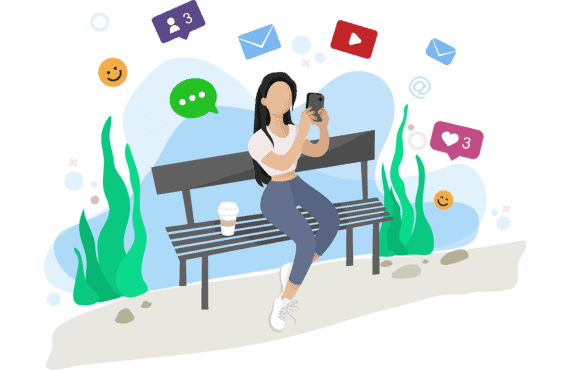
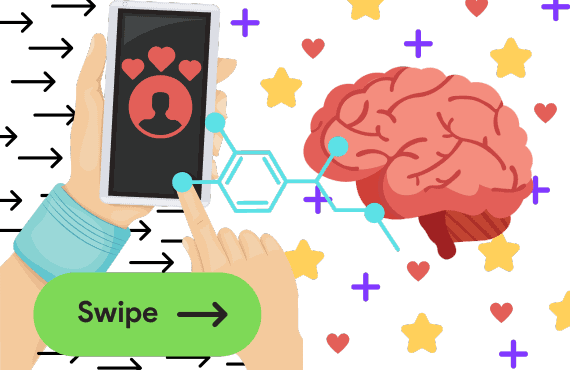
By making dating apps more like video games, we receive a nice hit of dopamine and the oh-that-feels-so-good neurotransmitter serotonin. There are two pathways to a shot of dopamine from online dating–when you get a reward out of the blue, your brain releases a flood of feel-good chemicals like adrenaline and dopamine as a boost.
The brain learns to anticipate rewards and increase its risk-taking level due to the unpredictability of the reward system. Once your brain becomes accustomed to the neurotransmitter release, it begins to look forward to and even enjoy your exposure to the stimulus that first triggered the release. This is what’s known as a “dopamine” or “feedback loop.” The user gets a rush and wants more of it, duh!
Our brains crave, nay, need, positive emotions for our mental well-being. Isn’t love and happiness what we all want? So it’s not at all surprising that this circle of reinforcement can lead to both dating app addiction and the dreaded dating app fatigue we so often hear about.
Negative Effects of Reward Feedback Loops
Excitement and short-term pleasure can result from the neurochemical reward systems, but addiction, fatigue, and feelings of isolation and loneliness are other possible negative effects.
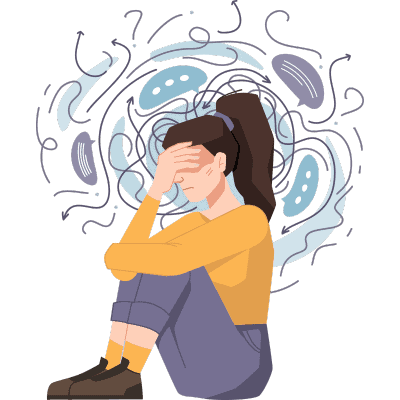
Dr. Kathryn Coduto discovered that those who suffer from severe isolation or social anxiety have a stronger desire for online social engagement, which manifests itself in obsessive usage of dating apps.
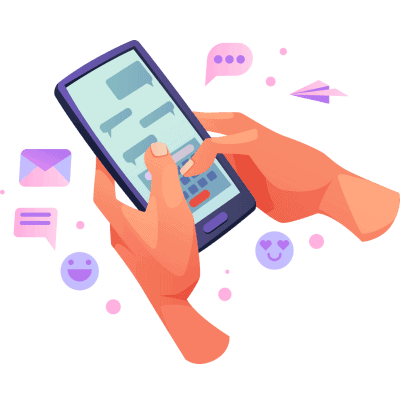
Dr. Coduto speculates that compulsive or excessive usage of dating apps “May in turn explain the resulting negative outcomes, such as use of dating apps in professional settings or choosing dating applications consistently over [face to face] interactions.
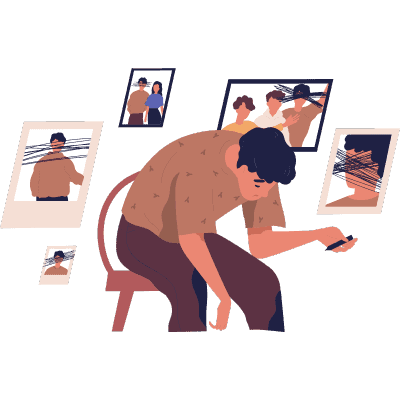
The University of North Texas also showed that Tinder users have worse self-esteem than non-Tinder users. Tinder users, regardless of gender, reported worse levels of psychological well-being and higher levels of body dissatisfaction, according to the study’s authors.
It seems there is a real-life price to pay for swiping. Not only does it affect our brains, but our interactions with others on dating apps also take a toll on them.
‘Ghosting’ Grows
The social repercussions and impact on interpersonal interactions are also important to consider when examining the psychological side of dating apps.
At the same time, as there are plenty more options for meeting potential romantic partners, the chance of getting “canceled” or your reputation being harmed due to bad behavior has diminished dramatically.
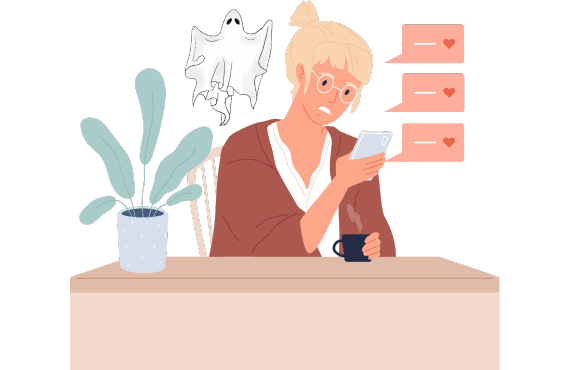
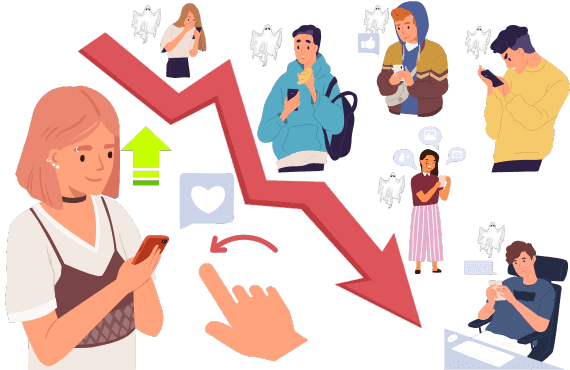
Before the advent of dating apps, people tended to date those in their own social circles. If you were rude or exhibited poor dating behavior IRL, your friends were bound to find out.
“While bad behavior has been around as long as humans have, there has been quite a dramatic increase in what could generally be described as narcissistic behavior that maximizes the pleasure of the individual over the feelings of others,” explains psychotherapist Dr. Denise Dunne.
“The normalization of bad dating behavior, giving it humorous child-like almost affectionate names like ‘ghosting’ or ‘submarining’ only serves to enable users to dismiss what might otherwise be regarded as rude or hostile or otherwise unacceptable behavior as just part of the experience.”
Dunne told Repeller how the game-like layout of numerous dating apps encourages inconsiderate actions. “The design could contribute to an objectification of user profiles and consequently reported narcissistic behavior of ghosting, bread-crumbing, benching, and general dishonesty,” she said. “If they are just characters in a game, then they do not have feelings to hurt.”
It’s Not All Bad News!
Dating apps decrease the societal repercussions of objectification, exploit our brain’s positive feedback loops, and make us feel lonelier. Still, there are plenty of good things regarding how dating apps have evolved!
Forbes found that people who use dating apps are more likely to meet different kinds of people. Josué Ortega, an economist at the University of Essex in the UK, and Philipp Hergovich, an economist at the University of Vienna in Austria, say that dating online leads to more interracial marriages and a more unified society.
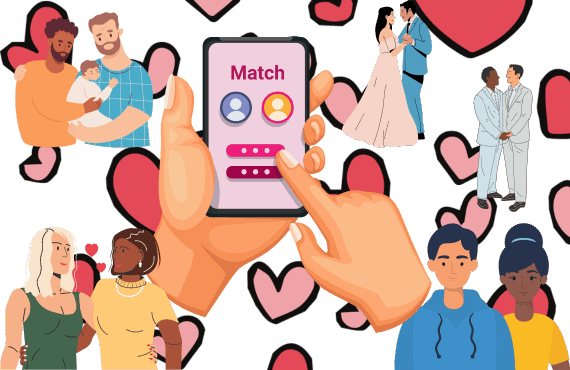
As with everything in life, opportunities come with positive and negative aspects, but if you take the time to learn more about an issue and how it fits into and impacts your life, you’ll be in a stronger position to deal with it.
By recognizing how to use dating apps in a healthy way, you can enhance your overall social interaction skills and find the love of your life.
Takeaways
The popularity and variety of dating apps have made it easier than ever to meet potential romantic partners. Yale neuroscientist Molly Crockett says in a paper about online moral anger that tech companies insist they do nothing more than provide a platform for socializing.
Similarly, dating app developers tout their products as ways to improve our lives without really altering them–they appear not to care if they’re manipulating our romantic habits or brain chemistry.
Tinder’s economic model would fail if every person found their soul mate on the app and then never used it again–they are dependent on the swiping behaviors of their customers. Researchers and developers of dating apps have the responsibility of figuring out how to ensure their users’ safety, but dating app users can take preventative measures to lessen the likelihood of addiction and swipe safely!
